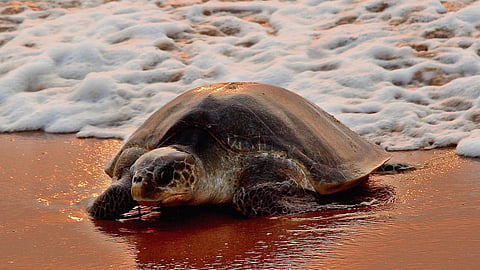

BENGALURU: Karnataka will be the second Indian state after Maharashtra to geo-tag olive ridley turtles that visit the state’s coast annually.
These geo-tags will not just have the identification number given by the State Government for others to report, but also track the movement of the turtles.
Elaborating, Haliyal Deputy Conservator of Forests Prashanth Kumar, who is also doing his PhD on this topic, said that when a turtle visits the Karnataka coast to lay eggs, a Precision Time Protection (PTP) tag will be clipped onto its back. Their nestings are found in Karwar, Honnavar, Kundapur, Udupi, and Mangaluru in Karnataka. The olive ridleys also visit Tamil Nadu, Goa, Maharashtra, and Odisha to lay eggs from December to May.
Each state will maintain a record of the geo-tagged turtles that visit their coast to lay eggs, and the same will be shared with the state that originally tagged the turtle and also other states to keep track of the turtles. To ensure this, the forest department is working in coordination with the Wildlife Institute of India and the Karnataka Biodiversity Board.
The need for geo-tagging rose due to multiple reasons. While some coasts are seeing a decline in the arrivals of the migratory species for nesting due to human interventions, others are seeing an increase.
“Sea sand erosion is on the rise, and multiple human interventions, like rocks and large stones, are put on the beaches to control it. Now, these turtles need at least 10-30 meters of free sand space from the ocean when they arrive to lay eggs. If there is any obstacle, they skip the location and go elsewhere. To understand and track them, geo-tagging is necessary,” Conservator of Forests, Canara Circle, KV Vasanath Reddy said.
It is also known that the olive ridley turtles visit the same location to lay their eggs annually. To maintain this natural cycle, geo-tagging is essential, said foresters from the field in Karwar.
Marine expert MD Subashchandran said that due to increased awareness and protection measures taken up by involving the local population, there is a rise in nesting locations along the Karnataka coastline. The forest department also offers cash prizes to fishermen who inform them of nesting locations and poachers. Geo-tagging will help improve vigilance, he added.